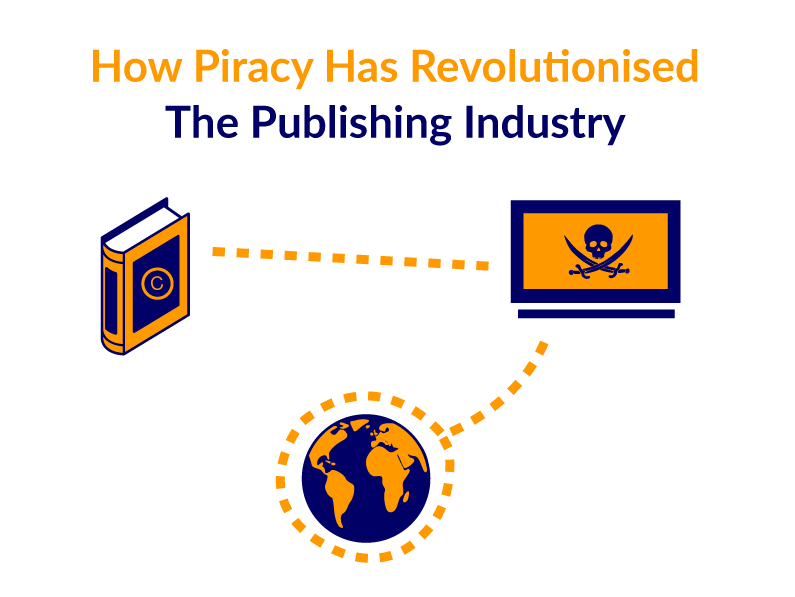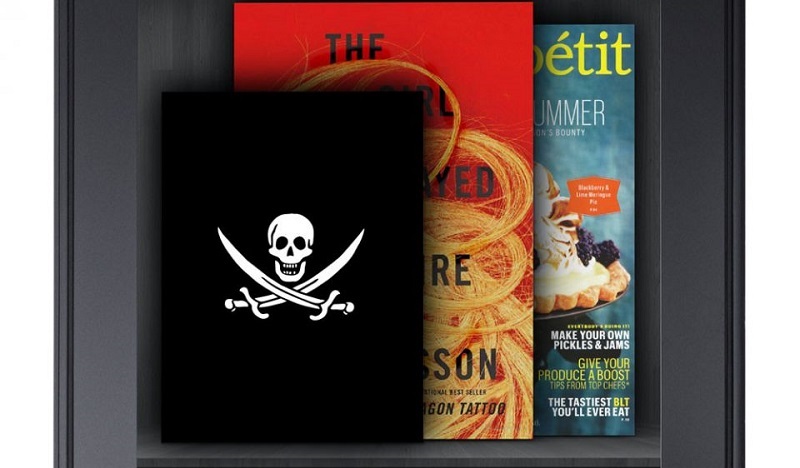Feature
How Piracy Has Revolutionised The Publishing Industry

Ankit Mahawar
April 24, 2018
If you are an Internet user, chances are that you have downloaded at least one pirated movie, song, or book. Congratulations, you have been a pirate.
Aye, matey!
The debate on whether it is right or not has been on for almost two decades and it just doesn’t seem to end. Many publishers claim they are losing millions of dollars per year, writers are afraid that readers won’t buy their books if free books are available on the Internet, and pirates believe that piracy results in higher future sales than present losses; we, as a result, never seem to know what exactly is happening. Whether you are for or against piracy, one thing is definite, it has completely changed how content is shared and accessed on the Internet. Another thing everyone seems to agree on is that piracy’s prevalence on the Internet is here to stay.
Understanding Piracy
Many people think that piracy means theft or counterfeit. However, these terminologies are quite different from each other.
Piracy is an unauthorised use or reproduction of someone else’s work while theft is claiming authorship of someone else’s work. For instance, if you are a writer and someone copies your book and launches it before you with his or her name as a writer, it is called intellectual property theft. As for counterfeit, it is a fake product, generally produced unofficially and could be of substandard quality. The books you see for sale on the streets or at traffic lights are generally counterfeit.
Piracy and theft are both governed by copyright infringement law across countries. While the actual law and its implementation might vary in different countries, piracy itself is undoubtedly illegal all around the world.
So, whether you are uploading an e-book or downloading it without authorisation, you are a pirate.
Ahoy! Captain!
(e-Book Piracy, via Jenny Jenkins)
Why Is Piracy So Common?
In spite of being illegal, piracy is very common among Internet users of all ages. Movies, music, software, and books are amongst the most popular things that are pirated on the internet. There are four major reasons for the piracy of e-books:
- Pricing: Many people live on a limited budget and thus are unable to afford books. So, when given the option to download and read books for free, they pirate them.
- Accessibility: Many books are either unavailable in some parts of the world or are extremely expensive to ship. Sometimes, there are no bookstores in the city or a particular book is not available in the bookstore. In such cases, it is easier for readers to just download the books off the Internet.
- Freedom: E-book pirates experience more freedom than regular e-book buyers. Pirated books can be shared easily as they are not DRM-protected. An official buyer has to have certain devices or apps to access the e-books and they cannot easily lend their books to their friends. Whereas, a pirated book can be read on any device and given to anyone.
- Experimentation: Piracy gives the reader a chance to try a book at absolutely no cost. When buying a book, readers have to be picky about the books they buy as they have to pay for the book even if it turns out to be a worthless read.
(Piracy, via CallSheet)
Losses To Publishers Due To Piracy
It is obvious that stealing or counterfeiting someone else’s creative property is undeniably wrong. But why is piracy considered wrong? The main reason is that publishers claim that they lose a lot of money resulting in lesser royalty to the writers. They assume that most people who download the e-books for free would buy the book if not for the piracy.
However, the actual loss of profits due to piracy can never be properly estimated as it is impossible to take all factors into consideration, like how many readers would buy the book if piracy wasn’t an option. Further, it does not take into account the number of people who may have started by reading pirated books but eventually began buying them.
Only because a person is pirating books does not mean it is a loss to the publishers. For example, a person might be downloading many e-books but not reading any of them and eventually deleting all of them. There is no procedure to filter out people like these. More importantly, it is highly improbable that these people would buy books at all in the first place.
However, there is a flip side to the argument- readers who are only not buying the books because they are available for free are causing a loss to publishers, but it is nearly impossible to ascertain how many such readers there are. Let’s be clear, this aspect of piracy is a problem and needs to be dealt with.
(e-Book Piracy, via Raynfall)
Is Piracy Helping The Publishers, Writers, And Readers?
Publishers rarely admit it but piracy is also helping them in the long run.
When a reader starts reading a book because it is freely available on the internet, they may eventually end up buying other books of the authors they discover. Further, readers who are reading pirated books because they don’t have money may eventually start buying books when they do have enough money.
In this way, piracy may also result in the future sales of new books, and the money ‘lost’ in sales could be equated with the money saved on advertisements. These books end up in the hands of readers whom they may never have reached with conventional methods. Often, fans emerge from all across the globe because of piracy.
Moreover, with piracy, as readers have the option to freely experiment in their reading, they may discover and eventually buy books they wouldn’t have otherwise.
(e-Book Piracy, via Good E-Reader)
What Writers Say About Piracy?
Another argument against piracy is that writers will have to discontinue writing if they lose a lot of money due to piracy, but, not everyone who is producing content is waging war on piracy. Cory Doctorow, Canadian-British journalist and author, says, “The writers who say that if they can’t get paid they’ll get a real job and stop writing are either kidding us, or kidding themselves.” He makes the point that the biggest problem for most writers is not piracy, it’s obscurity.
This reminds me of a dialogue from the movie, Pirates of the Caribbean when Norrington tells Captain Jack Sparrow “You are without a doubt the worst pirate I’ve ever heard of”, to which he replies “But you have heard of me.”
Doctorow has made most his books available on his website for free and still has managed to sell more than a million copies. Why are people buying his books when they can legally download all his books for free? The truth is people will pay for the books if they really like them.
Neil Gaiman, one of the most popular writers who initially was grumpy about piracy says, “What you’re actually doing is advertising. You’re reaching more people, you’re raising awareness. Understanding that gave me a whole new idea of the shape of copyright and of what the web was doing. Because the biggest thing the web is doing is allowing people to hear things. Allowing people to read things. Allowing people to see things that they would never have otherwise seen. And I think, basically, that’s an incredibly good thing.”
People were translating his books into Russian and spreading his work around, whenever he released a new book, it would sell more copies than his previous work. People were discovering him through piracy. So, he conducted an experiment. He made his book, American Gods, which was already on bookshelves in many bookstores, completely free for download on his website for a month. Not surprisingly, the sales of the book went up by 300%.
Not many have discovered their favourite authors by buying their books ad-hoc. The first book you’ve read by your favourite author was probably lent to you by a friend or family member. Gaiman adds, “You know, that’s really all this is. It’s people lending books. And you can’t look on that as a loss of sale. It’s not a lost sale, nobody who would have bought your book is not buying it because they can find it for free.”
(Piracy, via Digital Trends)
Piracy And Literature
What needs to be understood that piracy is not something to fight. It is never going to end. What can be done instead is use it as a tool to spread knowledge and literature to places they still haven’t reached. Piracy can be forged into a powerful device with exceptional potential.
No matter how unbelievable it might sound, but piracy, although being illegal, has revolutionised content-based industries. The electronic media has enabled content to reach people who otherwise had no access to it. Every single person, sitting in any part of the world, is a member of the world’s largest library ever created. Books were invented with the purpose to share knowledge and literature. Books expand our worldview and broaden our minds. So, the more people read the books, the more they will realise that they should pay for what they owe. Piracy’s contribution in enriching minds of individuals without any barriers is phenomenal. This is also the purpose of literature.
What are your thoughts on piracy? Do you think piracy is helping readers by sharing the knowledge? Share your thoughts with us in the comments below.


Ankit Mahawar
Ankit loves stories, be it in any form- print, media or theatre. After reading Angels and Demons, he fell in love with books, especially suspense, thriller, and fantasy. He is a big fan of Harry Potter series. He quit his engineering career to become a writer and worked with The Curious Reader. Apart from writing he also loves filmmaking, photography, traveling and cooking. You can reach him on Instagram.









Piracy is a serious issue for many authors but I have also found sales of books going up if they are “readily” available for general public.